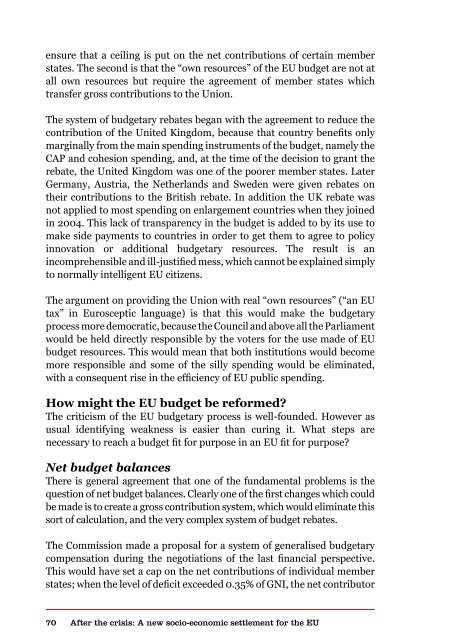Authors Iain Begg | Gabriel Glöckler | Anke Hassel ... - The Europaeum
Authors Iain Begg | Gabriel Glöckler | Anke Hassel ... - The Europaeum
Authors Iain Begg | Gabriel Glöckler | Anke Hassel ... - The Europaeum
Create successful ePaper yourself
Turn your PDF publications into a flip-book with our unique Google optimized e-Paper software.
ensure that a ceiling is put on the net contributions of certain member<br />
states. <strong>The</strong> second is that the “own resources” of the EU budget are not at<br />
all own resources but require the agreement of member states which<br />
transfer gross contributions to the Union.<br />
<strong>The</strong> system of budgetary rebates began with the agreement to reduce the<br />
contribution of the United Kingdom, because that country benefits only<br />
marginally from the main spending instruments of the budget, namely the<br />
CAP and cohesion spending, and, at the time of the decision to grant the<br />
rebate, the United Kingdom was one of the poorer member states. Later<br />
Germany, Austria, the Netherlands and Sweden were given rebates on<br />
their contributions to the British rebate. In addition the UK rebate was<br />
not applied to most spending on enlargement countries when they joined<br />
in 2004. This lack of transparency in the budget is added to by its use to<br />
make side payments to countries in order to get them to agree to policy<br />
innovation or additional budgetary resources. <strong>The</strong> result is an<br />
incomprehensible and ill-justified mess, which cannot be explained simply<br />
to normally intelligent EU citizens.<br />
<strong>The</strong> argument on providing the Union with real “own resources” (“an EU<br />
tax” in Eurosceptic language) is that this would make the budgetary<br />
process more democratic, because the Council and above all the Parliament<br />
would be held directly responsible by the voters for the use made of EU<br />
budget resources. This would mean that both institutions would become<br />
more responsible and some of the silly spending would be eliminated,<br />
with a consequent rise in the efficiency of EU public spending.<br />
How might the EU budget be reformed?<br />
<strong>The</strong> criticism of the EU budgetary process is well-founded. However as<br />
usual identifying weakness is easier than curing it. What steps are<br />
necessary to reach a budget fit for purpose in an EU fit for purpose?<br />
Net budget balances<br />
<strong>The</strong>re is general agreement that one of the fundamental problems is the<br />
question of net budget balances. Clearly one of the first changes which could<br />
be made is to create a gross contribution system, which would eliminate this<br />
sort of calculation, and the very complex system of budget rebates.<br />
<strong>The</strong> Commission made a proposal for a system of generalised budgetary<br />
compensation during the negotiations of the last financial perspective.<br />
This would have set a cap on the net contributions of individual member<br />
states; when the level of deficit exceeded 0.35% of GNI, the net contributor<br />
70<br />
After the crisis: A new socio-economic settlement for the EU

















